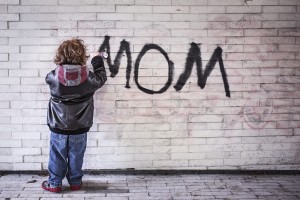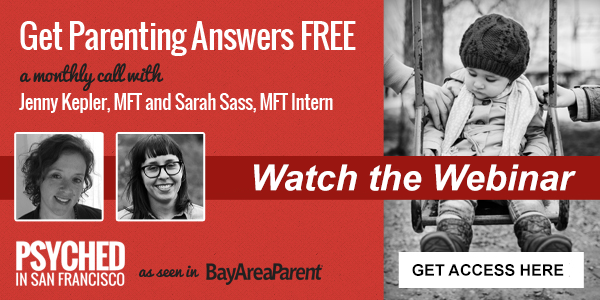What if She Turns Out Like Me? Braving Toxic Anxiety as a New Mom
It can be very hard to see our own suffering as gifts. I will cut right to the chase. I wish with all my heart it were different, but I have found in my work with mothers that many use the suffering they’ve faced as the foundation for self-criticism and hatred. For some, it becomes a secret kernel of toxic shame that says “I am something unlovable, I am something wrong,” and stays tucked deep inside. Often this tendency alone has already proved difficult enough in life and adult relationships, but when you add a baby to the picture, you give these toxic fears a focus.

For new moms, toxic shame may be practically imperceptible. You might just notice a bit of what we tend to think is typical for any new parent – a kind of nervous energy that ignites a passion for learning all there is to know about babies, attachment and development, which is actually a great thing. Mothers scour the net and search baby books for solutions to the problem of how to parent correctly. This kind of anxious pursuit can be healthy and normal; particularly when the seeker remains flexible, bearing in mind that there is no one way to do it correctly. In fact, as a family therapist, I am concerned when parents aren’t interested in bettering their parenting skills. Still, there are other mothers who read voraciously only to become more worried, overwhelmed and rigid in their thinking about how to parent their new babies. Rigidity worries me. Lots of the moms I work with fall into this category, and to be perfectly transparent, this was my tendency too as a new mom.
One way therapists think about anxiety is that it is a beacon, signaling us when something is important and worth paying attention to. That tugging feeling you had when you were deciding whether or not to invite your own mother to the birth, for instance, is anxiety. Rigidity – whether it shows itself as insistence around pacifiers or whether we hear it insisting, “I am doing this all wrong!”– is a signal that the mother’s internal state needs some care. When rigidity enters the picture, then we have left the realm of a healthy anxiety beacon and entered the realm of the toxic shame kernel working its way into this budding relationship between mother and baby. In this case the anxiety actually functions as a defense against experiencing shame that is too painful to acknowledge consciously. This shame says “I am so fatally flawed, I can’t possibly raise this child without damaging her.” We can see a defensive reaction to it in the tireless effort to learn all there is to know, perfectionism, rigidity around parenting philosophies.
Rigidity showed itself to me with my client Laura, a successful attorney living and working in San Francisco. I am pretty good at being with the intense emotions, painful stories and difficult situations that my clients bring to therapy without becoming overwhelmed or weighed down by them. But this moment is still painful to remember. Wringing her hands, Laura asked rhetorically, “What if she turns out like me?” intimating that this “me” was profoundly damaged, as her baby snuggled beside her. Much to my dismay, another client recently shared the same fear. “What if she turns out like me?” she asked, rigidly insisting that the “me” is unworthy of love and connection.
In order to tell the difference between a healthy beacon and a toxic kernel, we need to be curious about the pursuit – the activity of the anxiety. What are we trying to learn? A technique? A new way of thinking? What is the feeling that accompanies the searching – Hopefulness? Curiosity? Despair? Why so much pressure? Does it resolve for a time when you’ve finished the book, or are your hands still wringing? In Laura’s case, she did read tirelessly, and she insisted tirelessly but her anxiety also drove her into therapy. It’s true that therapy is another pursuit; but it is the act of seeking the whole self through connection, a pursuit that is actually an antidote to toxic shame.
I sit with a lot of moms in their raw, heart-splitting love for their children, and all the emotions that accompany it. Overwhelmingly, intense anxiety is a common thread. After all, we are talking about completely precious, and dependent little beings here. What could be more important? Knowing how horrible self-hatred and the belief that you are damaged feels, how could you possibly wish that upon your baby? What if she turns out like us? Of course we’re anxious!
For most people, shame becomes internalized and toxic when we’ve had intense experiences of it as children. Roots as superficially benign as a parent’s depression or absence, competitiveness or criticism can leave a child feeling unloved and inadequate, becoming chronic into adulthood. Having a baby stirs forgotten embers long left smoldering. There is just no getting around it. They are here to teach us the exact lessons we need to learn in order to be healthy and whole ourselves. If you are suffering because you fear your baby may turn out like you, then she is signaling you to find a way to heal some of the wounding you’ve received. In fact it is extremely important to do so for many reasons. Among them, quality of life and healthy bonding for your family. Left untreated, toxic shame can lead to aggression, depression, eating disorders and addiction. Shame can also be internalized by our growing children just by virtue of proximity to it.
With pressure, coal becomes a diamond. The more cuts, the brighter it shines. Your suffering, including intense anxiety about your new baby, is what shapes you. Because of your suffering you have navigated challenging waters, solved problems, grown stronger, become more empathic and more resilient. Without it, you would not have walked the path that led you to this baby you hold now. In this way, it is a gift.
Here are some things to think about when you’re ready to shift out of anxiety or shame and towards the mother you want to be:
- If you are preoccupied with worry or hopelessness, get help right away,
- In an age when we are awash in media information, the poison of comparing has never been more vicious. Keep a lid on social media when you are feeling anxious, because it only makes it worse.
- Trust your anxiety. By this point you’ve exercised your worry about being good enough so much that it’s like a strong muscle. You can count on it to do the heavy lifting, rest assured that you know how to do right, and focus your attention on being present with your baby. Easier said than done, right? It’s a practice, not a single event. Keep telling yourself, “I’ve got this.”
- Practice this basic visualization when you are feeling damaged, anxious or aggressive: Imagine the young you inside who feels this feeling. What age is she? Imagine the adult you holding her, reassuring her, inviting her to stay close. Do this every time you doubt your ability to raise an undamaged child.
- Work with a psychotherapist; it can help you rewrite your story.
If you have more parenting questions or need parenting support, Jenny Kepler co-leads a monthly FREE | LIVE | ANONYMOUS Parenting Questions and Answers call. The January call will be held the second Monday (Jan. 11, 2016). All other calls are the first Monday. Register below.

